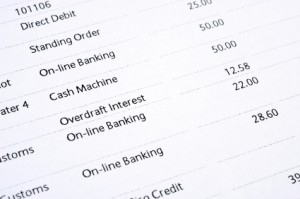 When a credit card company mistakenly overcharges a cardholder, this is often referred to as a billing error. This can occur when a merchant processes a purchase more than once or charges more money than what the account holder agreed to pay. Having your credit card stolen can also cause your card to be overcharged, but you cannot be legally held responsible for paying any more than $50 back to your credit card issuer.
When a credit card company mistakenly overcharges a cardholder, this is often referred to as a billing error. This can occur when a merchant processes a purchase more than once or charges more money than what the account holder agreed to pay. Having your credit card stolen can also cause your card to be overcharged, but you cannot be legally held responsible for paying any more than $50 back to your credit card issuer.
Use the credit card chaser to find online credit cards that provide account access online!
Rarely do credit card overages result from faulty calculations on the part of the issuer, but this is also possible. If your APR has recently changed, you might want to crunch the numbers yourself just to make sure that you are being charged fairly.
Online credit cards and credit unions usually give consumers access to web portals that will allow them to review their bills in real time. Accessing your online credit card account will also help you to quickly identify unauthorized charges or billing discrepancies well before the close of each cycle.
What should you do if you notice overages on your credit card billing statement?
Even though it is the duty of the cardholder to take notice of and report all billing inconsistencies, not everyone reads their credit card billing statements in detail. Since some credit card companies alert their customers when usual purchases are made, you can possibly take advantage of this feature to stop fraudulent charges from being processed in the first place.
You should call your credit card company, report billing errors online, or send a written correspondence to your credit card company when overages are identified. When billing errors and overages are made apparent within a reasonable amount of time, credit card issuers are much more likely to conduct a thorough investigation. The circumstances of your reported credit card overage will also have an impact on whether or not you are credited.
Letting your credit card company know that your credit card has been compromised as soon as possible will help you to mitigate your losses, however, this is not always doable. The official USA website recommends that consumers should file a stolen credit card report with the police in order to establish a verifiable time line. If nothing else, this will help you to back up your claims with your credit card company.
Is it worthy enrolling in credit card protection plans?
Most credit card protection plans shield consumers from being liable for any unauthorized charges that are reported to their credit card issuers, however, they are also expensive. Your credit card protection plan may come with additional features such as a life insurance policy and unemployment insurance, but you have to consider the total amount of money that you are paying.
Documentation from the FTC states that no more than $50 in unauthorized credit card charges can be accessed to a credit cardholder in the case of fraud or identity theft. If you are paying more than a few dollars a month for credit card protection and receive no further benefit, you may actually be paying an inflated price for a worthless service. Also, remember that interest can be charged on the amount of money that you are billed for credit card protection if you do not pay your balance in full monthly.
How do you report a credit card overcharge?
The formal name of the process that cardholders go through when they complain about credit card overages is called a dispute. To file a dispute, you must first identify the charges you did not authorize, and then you must provide an explanation to your credit card company. Most credit card issuers require disputes to be filed in writing.
Although the precise amount of time that you have to file a dispute varies from company to company, consumers have approximately 45 to 90 days after any overage occurs to make a complaint. Unfortunately, you will not be able to be compensated for an overage on your credit card if it was processed six months or more ago.
The Consumer Financial Protection Bureau is one of the few government agencies that accepted credit card complaints from consumers. If you believe that your credit card issuer has not handled your dispute properly or failed to investigate the matter to your satisfaction, you can also go to the Federal Trade Commission and the Better Business Bureau. Filing a complaint does not necessarily guarantee that your dispute will be settled in your favor, but it can help you to make your voice heard.
Go to credit card chaser and review the best credit cards available today!
Similar Articles:
- Where can I get help for a dispute with a credit card company?
- How does the credit card refund process work?
- How should I notify my credit card issuer about unauthorized use of my card?
- Will a credit card dispute cost me money?
- Do I need to cancel lost or stolen credit cards?
- What are my credit card rights?
- What do people mean by interest credit cards?








